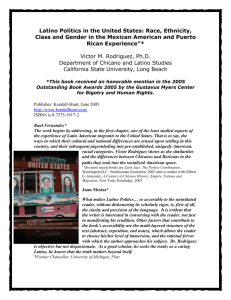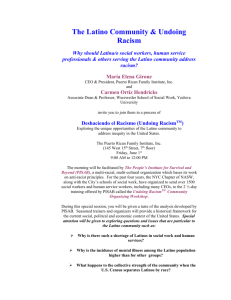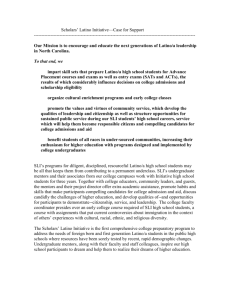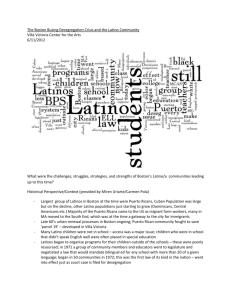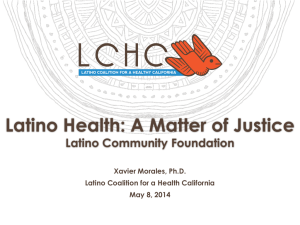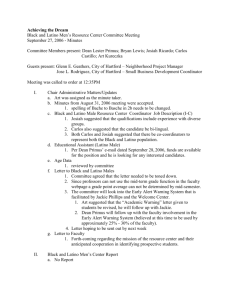USLT 498B/AMST 498M: Latino/as and U.S. Popular Culture
advertisement
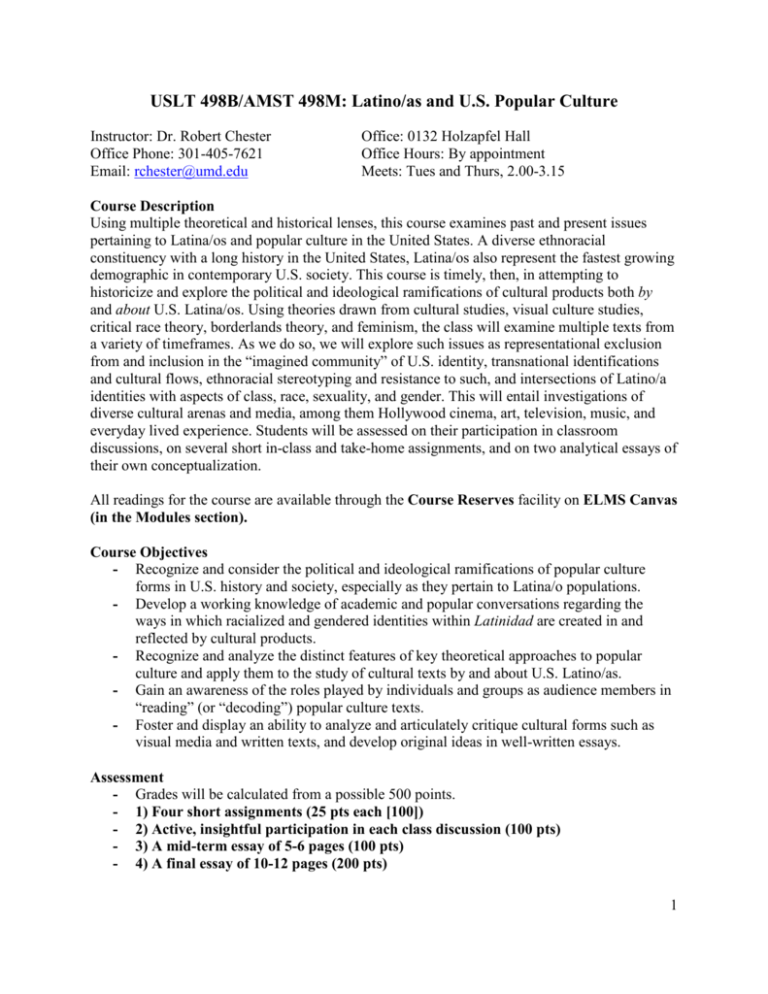
USLT 498B/AMST 498M: Latino/as and U.S. Popular Culture Instructor: Dr. Robert Chester Office Phone: 301-405-7621 Email: rchester@umd.edu Office: 0132 Holzapfel Hall Office Hours: By appointment Meets: Tues and Thurs, 2.00-3.15 Course Description Using multiple theoretical and historical lenses, this course examines past and present issues pertaining to Latina/os and popular culture in the United States. A diverse ethnoracial constituency with a long history in the United States, Latina/os also represent the fastest growing demographic in contemporary U.S. society. This course is timely, then, in attempting to historicize and explore the political and ideological ramifications of cultural products both by and about U.S. Latina/os. Using theories drawn from cultural studies, visual culture studies, critical race theory, borderlands theory, and feminism, the class will examine multiple texts from a variety of timeframes. As we do so, we will explore such issues as representational exclusion from and inclusion in the “imagined community” of U.S. identity, transnational identifications and cultural flows, ethnoracial stereotyping and resistance to such, and intersections of Latino/a identities with aspects of class, race, sexuality, and gender. This will entail investigations of diverse cultural arenas and media, among them Hollywood cinema, art, television, music, and everyday lived experience. Students will be assessed on their participation in classroom discussions, on several short in-class and take-home assignments, and on two analytical essays of their own conceptualization. All readings for the course are available through the Course Reserves facility on ELMS Canvas (in the Modules section). Course Objectives - Recognize and consider the political and ideological ramifications of popular culture forms in U.S. history and society, especially as they pertain to Latina/o populations. - Develop a working knowledge of academic and popular conversations regarding the ways in which racialized and gendered identities within Latinidad are created in and reflected by cultural products. - Recognize and analyze the distinct features of key theoretical approaches to popular culture and apply them to the study of cultural texts by and about U.S. Latino/as. - Gain an awareness of the roles played by individuals and groups as audience members in “reading” (or “decoding”) popular culture texts. - Foster and display an ability to analyze and articulately critique cultural forms such as visual media and written texts, and develop original ideas in well-written essays. Assessment - Grades will be calculated from a possible 500 points. - 1) Four short assignments (25 pts each [100]) - 2) Active, insightful participation in each class discussion (100 pts) - 3) A mid-term essay of 5-6 pages (100 pts) - 4) A final essay of 10-12 pages (200 pts) 1 Grading scale for each assignment - - A = Demonstrates outstanding mastery of content and application of concepts in completing the assigned work. Written work is clear and free from grammatical and typographical errors, and exhibits original insight and ideas. B = Demonstrates good understanding of content and concepts in completing the assigned work. Work may contain a few unclear sentences and grammatical errors. C= Demonstrates acceptable familiarity and understanding. Writing is unclear in several places and concepts are not fully explored. D= Demonstrates only sketchy grasp of concepts and course content. Poorly written. F= Does not demonstrate understanding or application of course material and concepts. Does not adequately address the task at hand. Writing is consistently unclear. I will provide details as each assignment approaches, and we will spend some time in class discussing the ins and outs of each particular essay or assignment. The following schedule may change slightly as we go along. I will, of course, let you know. Week 1: Introductions Thu 1/24: Introductions. Week 2: Theorizing Popular Culture Tue 1/29: Marita Sturken and Lisa Cartwright, “Practices of Looking: Images, Power, and Politics, in Practices of Looking: An Introduction to Visual Culture (Oxford University Press, 2001), 10-43. Thu 1/31: Stuart Hall, “Encoding/Decoding.” In Centre for Contemporary Cultural Studies, ed., Culture, Media, Language: Working Papers in Cultural Studies, 1972-79 (London: Hutchinson, 1979), 128-38 Week 3: Critical Approaches to Race and U.S. Latino/a Identity Tue 2/5: Michael Omi and Howard Winant, “Racial Formation,” 53-76. Thu 2/7: Robert Aponte, “Latinos in the US: The New Largest Minority & Its Discontents.” Journal of Latino-Latin American Studies, Vol. 1, No. 1 (Fall 2003): 29-46. Pedro A. Cabán, “Moving from the Margins to Where? Three Decades of Latino/a Studies,” Latino Studies Vol. 1, No. 1 (2003): 5-35. Week 4: Definitions and Complications Tues 2/12 Silvio Torres-Saillant, “Inventing the Race: Latinos and the Ethnoracial Pentagon,” Latino Studies, 1 (2003), 121-153. 2 Thu 2/14 Suzanne Oboler, “The Politics of Labeling: Latino/a Cultural Identities of Self and Others.” Latin American Perspectives, Vol. 19, No. 4 (Autumn 1992): 18-36. Week 5: Framing Cultural Images and Ideologies Tues 2/19 Frances R. Aparicio and Susana Chavez-Silverman, “Introduction,” in Tropicalizations: Transcultural Representations of Latinidad (Hanover: University Press of New England, 1997), 1-17. Thu 2/21 Myra Mendible, “Embodying Latinidad: An Overview,” in Mendible, ed., From Bananas to Buttocks: The Latina Body in Popular Film and Culture (Austin: University of Texas Press, 2007), 1-28. Charles Ramirez Berg, “A Crash Course on Hollywood’s Latino Imagery,” in Latino Images in Film: Stereotypes, Subversion, Resistance (Austin: University of Texas Press, 2002), pp. 66-86. Week 6: Borders Tues 2/26 Gloria Anzaldua, Borderlands/ La Frontera: The New Mestiza, pp.23-35, 99-113. Thu 2/28 Elana Zilberg, “Fools Banished from the Kingdom: Remapping Geographies of Gang Violence between the Americas (Los Angeles and San Salvador),” American Quarterly, Vol. 56, No. 3 (September 2004): 759-779. Film in Class: The Fence (La Barda) (2010) Week 7: Focus on Immigration: Harvest of Empire Tue 3/5: Film in Class: Harvest of Empire (dir. Peter Getzels and Eduardo Lopez, 2012) Thu 3/7: Harvest of Empire continued… 5-PAGE MID-TERM PAPER DUE IN CLASS Week 8: Central American Americans Tue 3/12: Arturo Arias, “Central American-Americans: Invisibility, Power, and Representation in the U.S. Latino World,” Latino Studies, Vol. 1, No. 1 (2003): 168-187. 3 Thu 3/14: Cecilia Menjívar, “The Power of the Law: Central Americans’ Legality and Everyday Life in Phoenix, Arizona” Latino Studies, Vol. 9, No. 4 (2011): 377-395. Marta Caminero-Santangelo, “Responding to the Human Costs of US Immigration Policy: No More Deaths and the New Sanctuary Movement,” Latino Studies, Vol. 7, No. 1 (2009): 112-122. Week 9: SPRING BREAK – Tue 3/19, Thurs 3/21: No Classes Week 10: US Conservatism and (Anti-)Latina/o Ideologies Tue 3/26: Samuel Huntington, Who Are We? Challenges to American National Identity (New York: Simon & Schuster, 2004), 221-255. Edward Telles, “Mexican Americans and the American Nation: A Response to Professor Huntington,” Aztlan, Vol. 31, No. 2 (Fall 2006), pp.7-23. Thu 3/28: Arlene Davila, “Latinos: ‘The New Republicans’ (They Just Don’t Know it)” in Latino Spin: Public Image and the Whitewashing of Race (NYU Press, 2008), pp.46-70. Week 11: Gender and Patriarchy Tue 4/2: Ramon Gutierrez, “Community, Patriarchy and Individualism: The Politics of Chicano History and the Dream of Equality,” American Quarterly, Vol. 45, No. 1 (March 1993), pp. 44-72. Rodolfo Corky Gonzalez, “I am Joaquin” http://www.latinamericanstudies.org/latinos/joaquin.htm Thu 4/4: Chela Sandoval, “U.S. Third World Feminism: The Theory and Method of Oppositional Consciousness in the Postmodern World,” Genders 10 (Spring 1991), 1-24. Clara Román-Odio, “Transnational Alliances, U.S. Third World Feminism, and Chicana Mestizaje in Ester Hernández’s Visual Art” Latino Studies 7 (2009), 317-335. Film in Class: Chicana (Silvia Morales, 1979) Week 12 – Focusing on Latina Bodies Tues 4/9 Mary C. Beltran, Latina/o Stars in U.S. Eyes: The Making and Meanings of Film and TV Stardom (University of Illinois Press, 2009), 62-85. 4 Priscilla Pená Ovalle, Dance and the Hollywood Latina: Race, Sex, and Stardom (Rutgers UP, 2011), 71-100. Thurs 4/11 Adriana Katzew, “Shut Up!: Representations of the Latino/a Body in Ugly Betty and Their Educational Implications.” Latino Studies Vol. 9, No. 2/3 (2011): 300-320. Karen R. Tolchin, “‘Hey, Killer’: The Construction of a Macho Latina, or the Perils and Enticements of Girlfight,” in Myra Mendible, ed., From Bananas to Buttocks, 183-198. Week 13: Black Latino/as, African Americans, and Cultural Coalition Tues 4/16 George A. Martinez, “African Americans, Latinos, and the Construction of Race: Toward an Epistemic Coalition,” Chicano-Latino Law Review (1998), pp.213-222. Tanya Kateri Hernandez, “‘Too Black to be Latino/a’: Blackness and Blacks as Foreigners in Latino Studies,” Latino Studies Vol. 1, No. 1 (2003): 152-159. Thurs 4/18 Pancho McFarland, Chicano Rap Roots: Black-Brown Cultural Exchange and the Making of a Genre,” Callalo Vol. 29, No. 3 (2006): 939-955. Raquel Rivera, “Hip Hop and New York Puerto Ricans,” in Michelle Habell-Pallan and Mary Romero, ed., Latino/a Popular Culture (NYU Press, 2002), 127-143. Week 14: Individual Meetings Tue 4/23: Individual Meetings with Instructor to discuss final papers Thu 4/25: Individual Meetings with Instructor to discuss final papers Week 15: Gender, Sexuality, and Latino/a Identities Tue 4/30: Daniel Enrique Perez, “Queer Machos: Gender, Sexuality, Beauty, and Chicano/Latino Men.” In Perez, Rethinking Chicana/o and Latina/o Popular Culture (NY: Palgrave, 2009), pp.9-36. Film in Class: On the Downlow (Tadeo Garcia, 2004) Thu 5/2: Film and discussion continued. 5 Week 16: Wrapping Up Tues 5/7: No Class – Work on Final Papers Thu 5/9: FINAL PAPER DUE IN CLASS Rules, Requirements, and the Like Participation: Student participation is essential to maximize our exchange of ideas and get the most out of the class. It also accounts for 20% of your final grade. Note: Simply turning up does not count as participation, but is only its prerequisite. I expect to hear from everyone each class, and will be taking note of who is contributing and, importantly, assuming a leadership role in facilitating discussion between students. All class discussion should be conducted respectfully: there is room for all viewpoints to be raised and debated. Participation also extends to watching films, TV, and online clips, both in class and as part of homework assignments. You should give undivided attention to the screen, and all electronic devices, newspapers, etc., should be turned off and put away before the class begins (unless you have a very good reason that I have approved, I don’t wish to see laptop computers in the classroom). In order to participate effectively, you must complete all readings and viewings on time and come to class with points to make and questions to ask. The in-class assignments will also help assess which students are fulfilling the requirements of the course and which are not. The syllabus is the guide, unless you hear otherwise, follow the syllabus to keep up. Papers and format: I will distribute information on the specifics of each paper as we go along. However, there are some matters of format that apply to each of them. All papers should be double-spaced, written in 12 point font, and include page numbers and a title. All papers must include a works cited page, and must be formatted to the conventions of a recognized academic citation style, preferably Chicago or MLA. Unexcused absences and lateness: Absences mean missing a significant portion of the material. Non-attendance means that students will not be eligible to receive participation points for that particular class. Students should also be on time, which means being seated and ready to begin by 2 o’clock. It is students’ responsibility to make up missed classes by borrowing notes from a classmate. Excused absences: Satisfactory documentation is required in order for an absence to be considered excused, and it must be presented in a timely fashion (the class period that you return, ideally). Please make a copy of your documentation for me to keep. You are responsible for making up missed material, assignments, and so on. Late Work Written work that is late without good reason will be penalized at the rate of 5 points a day (weekends count as one day). If you are absent when an assignment is due, you must e-mail me that assignment by class time and bring a hard copy to the next class to get credit. Late work may 6 be submitted via email in between classes, with a hard copy again due at the next class. Extensions on assignment deadlines can, in extenuating circumstances, be agreed with me before the due date. Additional Notes, disabilities, etc: Students with disabilities should contact the instructor at the beginning of the semester to discuss any accommodations for this course. Students with scheduling conflicts due to university activities, or with religious or cultural dates to observe, should also speak with instructor early in the semester. Academic Integrity: The University has approved a Code of Academic Integrity which prohibits students from cheating on exams, plagiarizing papers, submitting the same paper for credit in two courses without authorization, buying papers, submitting fraudulent documents, and forging signatures. The plagiarism policy specifies that all quotations taken from other authors, including from the Internet, must be indicated by quotation marks and referenced. Paraphrasing must be referenced as well. Acts of academic dishonesty will be referred to the UMCP Student Honor Council. Penalties for cheating, plagiarism and other forms of academic dishonesty can be severe. All members of the University Community share the responsibility to challenge and make known acts of apparent academic dishonesty. All the best for a productive and successful semester, Rob. 7
